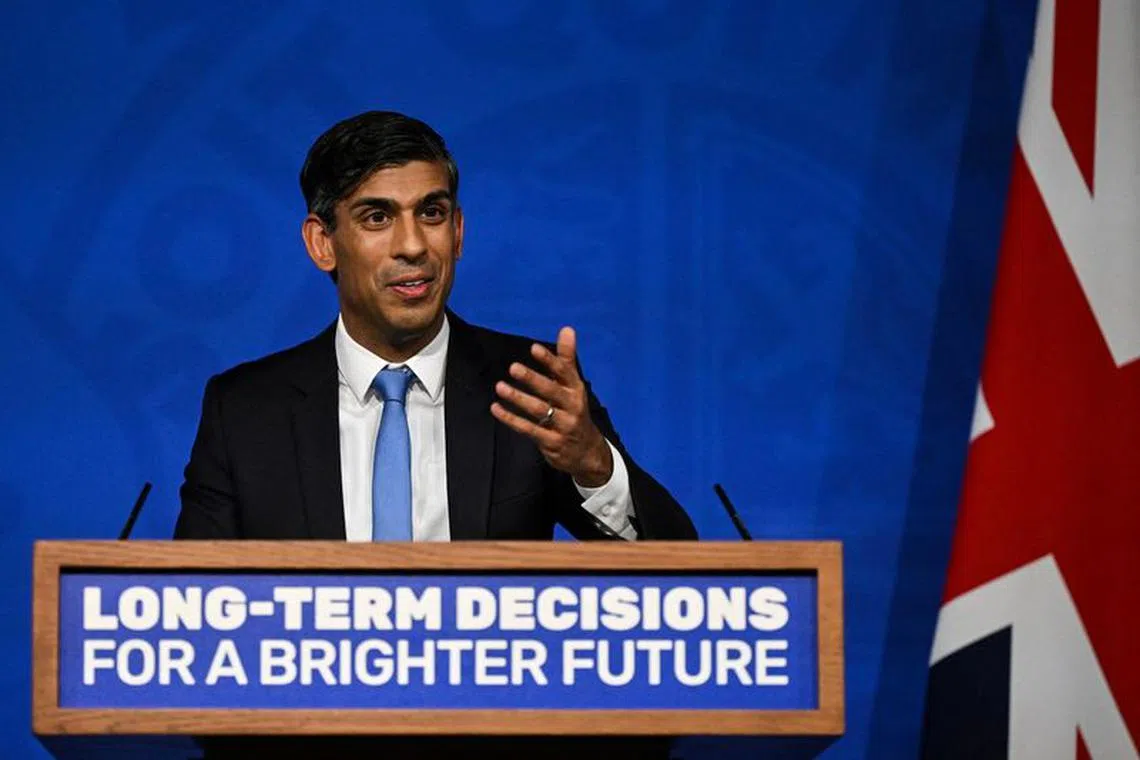Rishi Sunak pledges $2.7b to show COP28 that Britain remains committed to climate cause
Sign up now: Get ST's newsletters delivered to your inbox

British Prime Minister Rishi Sunak scaled back a series of green commitments, including delaying a ban on the sale of new fossil-fuel cars.
PHOTO: REUTERS
DUBAI - Mr Rishi Sunak will pledge to spend £1.6 billion (S$2.7 billion) on climate projects, as the British Premier arrives at the COP28 summit
Britain will contribute up to £40 million to the key loss and damage fund to help vulnerable countries cope with the impact of rising temperatures, £500 million to tackle deforestation and about £300 million for energy innovation projects, the government said on Nov 30, confirming a Bloomberg News report. Almost half of the £1.6 billion is new funding not included in Britain’s five-year, £11.6 billion climate aid funding pledge, which runs to 2026.
Britain has long tried to present itself as a global leader in the shift to renewable energy from fossil fuels, especially when it hosted the flagship climate summit in 2021 – an event Mr Sunak’s predecessor, Mr Boris Johnson, used to try to rebuild Britain’s international reputation after Brexit.
But the politics in Mr Sunak’s governing Conservative Party have changed dramatically since then, and the Prime Minister is trying to use green policy and climate change to draw a dividing line with the poll-leading opposition Labour Party ahead of a general election expected next year.
In September, Mr Sunak scaled back a series of green commitments,
“There’s no doubt our standing has diminished considerably in recent months,” former minister Zac Goldsmith, who resigned from Mr Sunak’s government in part due to its approach to climate issues, told Sky News. Mr Goldsmith added he believes Britain is not seen by its allies “as a reliable or serious partner”.
Mr Sunak rejected that claim, telling reporters on the way to Dubai that he will “walk around very proudly” at the summit because Britain remains “a leader on this issue.”
On Nov 30, he stressed he was not “in hock to ideological zealots on this topic” and promised to get to net-zero “in a sensible way that saves people money and doesn’t burden them with extra costs”.
The problem for Mr Sunak is that he risks being upstaged by Labour leader Keir Starmer, who is also in Dubai to meet heads of state and business leaders. He will pledge to make Britain the “green finance capital of the world” and mobilise private finance behind climate action by requiring financial institutions and FTSE 100 firms to publish their carbon footprint and adopt climate transition plans.
Trailing Labour by 20 points in the polls, Mr Sunak is having to get used to executives and prime ministers seeking meetings with Mr Starmer even at events hosted by the British government. That happened during his investment summit this week, while a Britain-Greece diplomatic spat meant Greek Premier Kyriakos Mitsotakis left London on Nov 27 having spoken to Mr Starmer but not Mr Sunak.
Mr Sunak’s argument for slowing down on climate change is that Britain is ahead of many of its peers, and that it is unfair on British taxpayers to do more until other countries have caught up. But the UK’s independent Climate Change Committee said in June that Britain’s chances of achieving its climate goals are getting slimmer, just as the government should be accelerating efforts.
Mr Gareth Redmond King, international lead at Energy and Climate Intelligence Unit, likened Mr Sunak’s approach to the hare in the fable of the hare and the tortoise, pointing to the scale of investments in clean technology from China, the European Union and the US.
“You’re only a leader while you’re still leading,” he said. “You stop and stand still and demand that everybody else catches up with you, then you lose your leadership and people overtake you.”
Mr Johnson’s legacy will also be hanging over Mr Sunak as he lands in Dubai, where COP28 is being billed as the first global stock-take of progress toward ensuring the world’s average temperature rise does not exceed 1.5 deg C.
According to Dr Lavanya Rajamani, professor of international environmental law at the University of Oxford, one of the biggest achievements from Britain’s COP summit was for all countries to align their plans with 1.5 deg C rather than 2 deg C.
“That was an achievement of the UK government,” she said. “It was their legacy from the COP, so they need to be able to show that they’ve put the plans in place to actually make that possible.” BLOOMBERG


